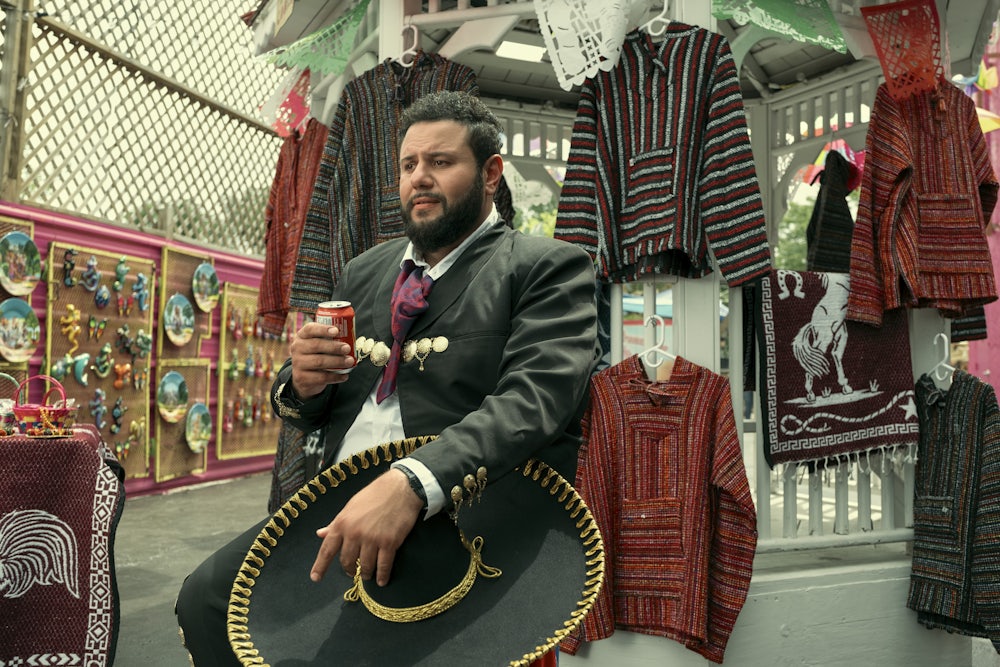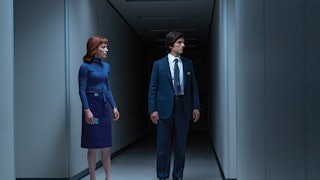In the winter of 2023, in an interview with Sally Rooney, the Palestinian novelist Isabella Hammad wrote that she believes “in the political value of slow forms, of art-making.” Asked by Rooney to talk about the relationship between “artistic-intellectual work” and political activism, Hammad spoke about the “staggering speed” with which the war in Gaza had escalated, but speculated that, nevertheless, “the present extremity of violence will eventually crest (even though this is actually very difficult to think about right now) and the tempo will shift and the slow people will become useful again.”
The second and final season of Mo on Netflix carves out a space for itself amid this shifting tempo of events. Co-created by Palestinian-American stand-up comedian Mohammed Amer, Mo is the semi-autobiographical story of a thirtysomething Palestinian refugee named Mo Najjar, who lives in Houston with his family. Mo is fluent in Arabic, English, and Spanish, and the show slides constantly between the three languages as he moves between three—sometimes many more—cultures. For almost the entirety of both seasons, Mo, along with his brother and mother, are undocumented, decades into the impossibly long queue for an asylum hearing. And so, the show observes the ordinary life of a man who, like millions of others, is flotsam in the American immigration system: living and hustling and falling in love within a polyglot, multicultural community of immigrants; working under the table; trying desperately to avoid minor infractions of the law; refusing hospital care in order not to be discovered by ICE. Mo, I should say, is incredibly funny, but the show’s conversational comic style and Amer’s warm, charismatic central performance are necessary counterbalance to the narrative grind of Mo’s story.
It has often been said that a virtue of twenty-first-century television is its capacity for slowness. Free of the pressure to pile up plot, cable and streaming serial dramas can afford to pace themselves, indulging in side-quests, character-deepening departure episodes, formally audacious bottle episodes, extended meditations, and dream sequences. The Sopranos took the time to get lost in the woods with its characters, The Wire methodically built its plot architecture like Lester Freamon building a doll house, Breaking Bad lingered at excruciating length on all the individual decisions that led Walter White to damnation. We see that same almost fetishized commitment to slowness in contemporary hits like The Last of Us and Severance.
Mo is a series of mixed tempos. In some ways, it is quite fast: While its style is a recognizable observational realism, it moves with the speed of a caper, egged on by Amer’s fast-talking monologues. And, narratively, it’s had to hurry itself along. Granted only two seasons, the show essentially flushed its hero down the drain of the American immigration system, like a foul-mouthed Gulliver, sped along by a strong current from stop to stop. And, of course, there was speed to its political responsiveness: The show ends on October 6, 2023—one day before the kidnappings of October 7 and the outbreak of the war.
But the show is also deeply invested in slowness: in the depiction of bureaucracy and the slow-motion existence of the refugee and the long shadow of long-ago events, but also, for instance, in the serene pastoral beauty of a Texas olive farm. Mo is a show about humanity, crushed and leveled by systems but ultimately resilient. It’s equal parts The Wire and Curb Your Enthusiasm. And it moves sometimes fast, sometimes slow.
There’s a small, throwaway moment early in Mo’s second season that seems to me to articulate something central about the show’s grand insight. It happens when Mo is being held in an ICE detention facility in South Texas.
At the end of the show’s first season, Mo—fired from his job at a cell phone shop and hawking “authentic replica” fashion from the trunk of his car—starts working for an olive farmer outside of Houston, installing anti-theft trackers among the trees in the grove. When a few trees go missing, Mo activates the tracker and chases down the culprits to a gas station a few miles away. Inspecting the trees in the back of a truck, Mo accidentally gets locked in, and, next thing he knows, he’s been transported to Mexico by the migrant workers—his friends—who stole the trees. Over drinks, Mo learns that his accidental kidnappers view their theft as recompense for their ancestors’ own displacement by white ranchers like the one they work for. Mo tries to explain how uniquely he understands this, but his attempts to explain out loud fall on deaf ears. Either way, they let him go, but plans go sideways, and Mo ends the first season stuck across the border, being chased by a cartel, a double refugee.
At the start of the second season, Mo’s adapted to his life in Mexico City, selling falafel tacos on the street, shaking maracas in a mariachi band, performing as a luchador called Oso Palestino (the Palestinian Bear), and trying, by any means necessary, to make it back to the States. He exhausts the Kafkaesque bureaucratic solutions (embodied by edgelord comedian Matt Rife as a prickly prick of an embassy official), and he exhausts the limits of his own charm. After a lot of schmoozing, he gets the ambassador himself to grant him the necessary paperwork only to have the offer rescinded when Mo refuses to drink a toast to “peace” between Israel and Palestine. So he turns to the coyotes, who get him across the river and, of course, immediately arrested.
Which brings us to the moment with the guard at the detention facility. Mo’s several days into his stay, and he’s been really working a charm offensive on one particular guard, trying to convince him to call his attorney. After he finally seems to win him over, the guard pulls Mo out of his large group cell. Mo is ecstatic until he realizes he’s just being moved into a smaller, smellier transitional cell. Aghast, Mo says to the guard, “We had a bond!” The guard, who’d been, to this point, committed to deadpan detachment, suddenly becomes animated. He replies, hotly, “Why would you think that?”
Why would you think that? Everybody likes Mo. It’s both a character trait and a narrative feature of the show. He gets out of nearly every jam, no matter the stakes, by talking his way out of it. He is full of anger, but his manner is broad and convivial. In the gap between seasons, Mo is stranded in Mexico City for six months, during which time he starts a successful small business, makes a new best friend, and fully ingratiates himself to the family of his ex-girlfriend. To be this kind of rascally, huggable charmer in every situation requires a kind of perverse optimism, a belief that systems, like relationships, are places where humanity and fellow feeling are acknowledged and rewarded. But over and over again, Mo is proven wrong in that. The social currency Mo has is worthless with the courts, with the cops, with ICE, with the Israel Defense Forces, with the settlers. Who he is is worthless to them. Mo mistakes his growing relationship with the ICE guard for a relationship with the state. Why would he think that?
But Mo is not building toward the granting of asylum, nor the fruition of a business plan or a love affair. It’s not held within the borders of this country or that. The show is, in a fairly earnest and straightforward way, building toward representation. Mo’s mother—Farah Bsieso, in the final speech of a fearsome and fragile performance—comes right out and says it. “Your father was like you. He saw himself through the world’s eyes,” she says. “The world will always try to tear us down, and when they do, we smile, because we know who we are.”
Mo is a comedy of all the different ways the world sees a man like Mo. Over the course of this final season, Mo “performs” these versions of himself to effect in a series of sticky situations: To the militia arresting him at the border, he plays a “Texan”; to the settler threatening his family, he’s an “American”; to the Italian restaurateurs to whom he’s selling olive oil, he plays an “Italian”; to the frightened diners at a high-end Israeli fusion restaurant, he plays a “terrorist,” and so on, and so on. Mo transforms his despair at not being seen into a special shapeshifting power. But at the end of the show, in Palestine finally, Mo knows who he is.
At one time, television promised a new slowness and deliberateness in ambitious epics. But in the era of Peak TV the more humble form Mo takes, the half-hour dramedy, has given us something like a small archive of lives on networks from FX to Max to Netflix. Reservation Dogs, Somebody Somewhere, Better Things, Los Espookys, Work in Progress, Ramy (whose creator Ramy Youssef co-created Mo)—these too are shows about what the world sees, and what lies beneath, or just marginally out of sight. And the archive is growing, slowly.






